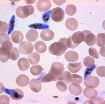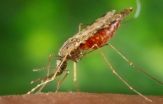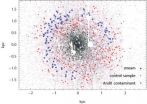(Press-News.org) Two teams have independently discovered that a single regulatory protein acts as the master genetic switch that triggers the development of male and female sexual forms (termed gametocytes) of the malaria parasite, solving a long-standing mystery in parasite biology with important implications for human health. The protein, AP2-G, is necessary for activating a set of genes that initiate the development of gametocytes -- the only forms that are infectious to mosquitos. The research also gives important clues for identifying the underlying mechanisms that control this developmental fate, determining whether or not a malaria parasite will be able to transmit the disease.
Even today, there is still a risk that malaria could be reintroduced into the United States and Europe, where malaria was largely eliminated by the 1950s. However, nearly half of the world's population -- 3.3 billion people -- currently live in 106 countries and territories that are at risk of malaria transmission, according to the U. S. Centers for Disease Control and Prevention. The World Health Organization estimates that there were 207 million cases of malaria and 627,000 deaths worldwide in 2012. Approximately 77 percent of those killed were children under the age of 5.
Malaria is caused by single-celled Plasmodium parasites. To survive and reproduce, these parasites have a rather complex lifecycle that involves three major stages. First, after a person is bitten by a parasite-carrying mosquito there is an initial infection in the liver, followed by the long-lasting red blood cell stage where the clinical symptoms of the malaria disease occur, and finally the mosquito stage, which is required to transmit the parasites to other people. All three stages are essential for the parasite to fully complete its developmental lifecycle. Surprisingly, the major blood stage form of the parasite that causes the terrible cycles of intense fevers associated with malaria in humans cannot be transmitted to mosquitos. For mosquito transmission to occur, the sexual form gametocytes, which are structurally distinct and have a very different program of gene and protein expression, have to form continually in the blood on a 2-day cycle. However, malaria parasites produce only a small number of sexual parasites per cycle – a double-edged strategy for the parasite that, on the plus side, ensures its survival during dry seasons when mosquitos are rare, but on the down side also represents a potentially vulnerable chokepoint. How parasites "decide" to produce sexual stages has been a mystery that has puzzled malaria researchers for years.
"Exciting opportunities now lie ahead for finding an effective way to break the chain of malaria transmission by preventing the malaria parasite from completing its full lifecycle," said Manuel Llinás, an associate professor of biochemistry and molecular biology at Penn State University. Llinás is the leader of an international team of scientists whose paper describing their research will be published in the journal Nature on the Advance Online Publication website, http://www.nature.com on 23 February 2014 along with a second paper, which describes related work led by Andy Waters (University of Glasgow) and Oliver Billker (Wellcome Trust Sanger Institute). Both manuscripts detail the role of the same AP2-G transcriptional regulator with remarkably similar findings -- despite the different groups' having worked with two highly diverged malaria parasites: Plasmodium falciparum, which causes the most severe form of human malaria and Plasmodium berghei, a commonly used model parasite infecting rodents.
"This sexual-stage bottleneck is an enticing target for interventions to prevent this comparatively small, yet critical number of sexual parasites from forming. If the sexual forms of the parasite never develop in an infected person's blood, then none will get into the mosquito's gut, and the mosquito will not be able to infect anyone else with malaria." Llinás said.
The study led by Llinás was initiated by experiments from Alfred Cortés' group at the Barcelona Centre for International Health Research, in which individual human malaria parasite clones from a single strain were found to have varying levels of the transcriptional regulator AP2-G, which mirrored varying levels of sexual stage (gametocyte) production. "The results were surprising because we found huge differences in the number of sexual-stage parasites produced by the different cell lines," Llinás said. One cell line produced ten times more than any of the others, most produced very few, and some produced none at all. Further experiments went on to show that the actual level of sexual-stage parasites produced by each parasite clone matched the proportion of individual cells specifically producing the AP2-G protein. "Our results perfectly correlate the expression of the ap2-g gene with the number of sexual-stage malaria parasites formed." Llinás said.
Because all these parasites share the identical DNA, or genetic makeup, yet the descendants of the individual cells produce significantly different numbers of sexual-stage parasites, Llinás said "we suspect that something outside the genes -- something other than a mutation in the DNA sequence -- is controlling the development of sexual-stage parasites." The research suggests that this phenomenon is not encoded directly in the parasite's DNA, but rather in other "epigenetic" differences between the parasites. In fact, Llinás said, "previous work has identified that a strong, repressing, epigenetic histone modification is present at the ap2-g gene and a few other locations in the malaria parasite genome." Cortés added: "For many years we have known that malaria parasites use epigenetic mechanisms to evade immune responses from the human host. Now we know that epigenetic mechanisms also regulate many other important processes in malaria parasite biology, including sexual differentiation".
When scientists discover a protein such as AP2-G that regulates a biological process, the typical next question is: and what other protein controls this regulator? "A beautiful aspect of our findings is that we don't need an upstream regulator for AP2-G. Instead, AP2-G can be activated by epigenetic mechanisms providing a plausible explanation for how low-level sexual conversion is triggered", says Cortés.
In what was originally a separate line of investigation, David Baker and Taane Clark and colleagues at the London School of Hygiene & Tropical Medicine and the Wellcome Trust Sanger Institute analyzed the whole-genome sequences of two P. falciparum laboratory strains that they knew were unable to produce gametocytes. Remarkably, they found that the only mutated, non-functional gene common to both strains was the ap2-g gene. David Baker said that "for more than 20 years my lab has been interested in identifying a malaria parasite gene underlying the switch to sexual development and finally the ap2-g locus, under epigenetic control, has come to light."
In the parallel study by the Waters and Billker groups, rodent malaria parasites that eventually lost their ability to produce sexual-stage parasites were selected over the course of a year in the laboratory (where the mosquito stage is not required). Using next-generation sequencing to identify the underlying mutations causing these effects, the groups found that the only common suspect was again the ap2-g gene -- the gene that codes for producing the AP2-G protein.
To confirm these observations, both studies disabled the ap2-g gene by cutting it out of the genome to remove its function from the parasite and the manipulated parasites indeed lost the ability to generate sexual-stage parasites. Furthermore, the parasites regained the ability to make gametocytes when the mutated gene in the selected rodent malaria parasites was repaired through gene therapy. Combined with other experiments, the results showed that sexual-stage malaria parasites are produced only when the AP2-G protein is in good working order. "Our research has demonstrated unequivocally that the AP2-G transcription-factor protein is essential for flipping the switch that initiates the transformation of malaria parasites in the blood from the asexual stage to the critical sexual stage of their life cycle," Llinás said.
The researchers agree these discoveries are exciting for the future of malaria research. Cells that make AP2-G enter sexual development, something that the groups are now able to control experimentally. "This opens the way to develop assays to screen for effective drugs that could disable commitment to sexual development and prevent transmission," comments Waters.
Billker adds "the discovery of AP2-G now gives us a new starting point to work out how the complex life cycle of malaria parasites is regulated by proteins within the parasite cells. It may even enable us to control parasite development in the laboratory."
The new ability to culture lots of sexual-stage malaria parasites will boost efforts to develop a sexual-stage vaccine that would help an infected person mount an immune response to prevent their malaria parasites from being transmitted to a mosquito -- effectively ending the life cycle for that person's batch of malaria parasites. "With the help of the next-generation technologies that we and other malaria researchers now are using, we are optimistic about more discoveries for malaria control that could occur soon -- even during the next 5 years," Llinás said.
INFORMATION:
CONTACTS
Manuel Llinas: manuel@psu.edu, (+1) 814 867 3444
Barbara Kennedy (PIO): science@psu.edu, 814 863 4682
IMAGES
High-resolution images are online at http://science.psu.edu/news-and-events/2014-news/Llinas2-2014
CAPTIONS and CREDITS
1) In blue are Plasmodium falciparum malaria parasites in the sexual, gametocyte stage of development. In red are uninfected red blood cells. Credit: Manuel Llinas lab, Penn State University
2) An Anopheles mosquito takes a blood meal through the skin. If this blood carries sexual-stage stage parasites, they will develop in the mosquito and be passed on to others who are bit by this mosquito days later. Credit: U.S. Centers for Disease Control
COAUTHORS
In addition to Llinas, who did part of the research at Penn State University and part at Princeton University, other coauthors of the two Nature papers include Björn F.C. Kafsack and April E. Williams at Princeton University; Núria Rovira-Graells, Cristina Bancells, Valerie M. Crowley, and Alfred Cortés at research institutes in Spain; David A. Baker, Taane G. Clark, Susana G. Campino, Dominic P. Kwiatkowski, Laura G. Drought, Abhinav Sinha, Katie R. Hughes, Katarzyna Modrzynska, Thomas D. Otto, Claudia Pfander, Nicholas J. Dickens, Agnieszka A. Religa, Ellen Bushell, Anne L. Graham, Rachel Cameron, Matthew Berriman, Oliver Billker, and Andrew P. Waters at research institutes in the United Kingdom. The institutes in Catalonia (Spain) include the Barcelona Center for International Health Research, the Institute for Research in Biomedicine, and the Catalan Institution for Research and Advanced Studies. The U.K. institutes include the London School of Hygiene and Tropical Medicine, the Wellcome Trust Sanger Institute, and the Wellcome Trust Sanger Centre for Human Genetics.
FUNDING SOURCES
U.S. National Institutes of Health (R01AI076276) and its Center for Quantitative Biology (P50GM071508), Damon Runyon Cancer Research Foundation, Wellcome Trust (094752, 098051-090532/Z/09/Z, 083811/Z/07/Z), European Commission (FP7-MALSIG-223044), U.K. Biotechnology and Biological Sciences Research Council, Spanish Ministry of Science and Innovation (SAF2010-20111), Catalan Government (AGAUR 2011-BP-B 00060), IRB Barcelona, U.K. Medical Research Council (G0600230, G0501670, and J005398 ), and Evimalar (242095)
A key protein is discovered as essential for malaria parasite transmission to mosquitos
2014-02-23
ELSE PRESS RELEASES FROM THIS DATE:
Stream of stars in Andromeda satellite galaxy shows cosmic collision
2014-02-23
The Andromeda Galaxy is surrounded by a swarm of small satellite galaxies. Researchers from the Niels Bohr Institute, among others, have detected a stream of stars in one of the Andromeda Galaxy's outer satellite galaxies, a dwarf galaxy called Andromeda II. The movement of the stars tells us that what we are observing is the remnant of a merger between two dwarf galaxies. Mergers between galaxies of such low mass has not been observed before. The results are published in the scientific journal, Nature.
The galaxies in the early universe started off small and the theory ...
Researchers pinpoint brain region essential for social memory
2014-02-23
NEW YORK, NY (February 23, 2014) — Columbia University Medical Center (CUMC) researchers have determined that a small region of the hippocampus known as CA2 is essential for social memory, the ability of an animal to recognize another of the same species. A better grasp of the function of CA2 could prove useful in understanding and treating disorders characterized by altered social behaviors, such as autism, schizophrenia, and bipolar disorder. The findings, made in mice, were published today in the online edition of Nature.
Scientists have long understood that the hippocampus—a ...
Nanoparticles target anti-inflammatory drugs where needed
2014-02-23
Researchers at the University of Illinois at Chicago have developed a system for precisely delivering anti-inflammatory drugs to immune cells gone out of control, while sparing their well-behaved counterparts. Their findings were published online Feb. 23 in Nature Nanotechnology.
The system uses nanoparticles made of tiny bits of protein designed to bind to unique receptors found only on neutrophils, a type of immune cell engaged in detrimental acute and chronic inflammatory responses.
In a normal immune response, neutrophils circulating in the blood respond to signals ...
Climate change won't reduce deaths in winter
2014-02-23
New research published today (Sunday 23rd February) has found that climate change is unlikely to reduce the UK's excess winter death rate as previously thought.
The study is published in the journal Nature Climate Change and debunks the widely held view that warmer winters will cut the number of deaths normally seen at the coldest time of year.
Analysing data from the past 60 years, researchers at the University of Exeter and University College London (UCL) looked at how the winter death rate has changed over time, and what factors influenced it.
They found that from ...
Scientists unlock a 'microbial Pompeii'
2014-02-23
An international team of researchers have discovered a 'microbial Pompeii' preserved on the teeth of skeletons around 1,000 years old. The key to the discovery is the dental calculus (plaque) which preserves bacteria and microscopic particles of food on the surfaces of teeth, effectively creating a mineral tomb for microbiomes.
The research team discovered that the ancient human oral cavity carries numerous opportunistic pathogens and that periodontal disease is caused by the same bacteria today as in the past, despite major changes in human diet and hygiene.
The researchers ...
Christian Band The Sunrise to Perform at the 2014 Bringing America Back to Life Symposium
2014-02-23
The Sunrise will be performing at this year's Bringing America Back to Life Symposium and Exhibition presented by Cleveland Right to Life on March 7th, 2014 & March 8th, 2014.
The event features pro-life speakers including David Barton of WallBuilders, and Pam Tebow, mother of Tim Tebow. This is one of the nation's largest pro-life events of its kind, and the event completely sold out in 2013.
Those interested in attending this event can visit the Bringing America Back to Life website at: http://www.bringingamericabacktolife.org/index.html
In addition, The ...
Victory Over Stroke Symposium Set for March 20, 2014
2014-02-23
The Stroke Association of Florida has announced its Fifth Annual Victory Over Stroke symposium, scheduled for Thursday, March 20, 2014, 9 a.m. to 1 p.m., at H2U Blake Medical Center, 6670 Cortez Road W. in Bradenton, Florida.
Ana M. Guillermo, H2U Program Manager, will emcee the free event, which includes presentations from distinguished local speakers, free stroke risk health screenings and exhibitors. Lunch will be provided.
"The goal of Victory Over Stroke is to raise awareness about stroke symptoms and the critical need to call 911, what you can do to minimize ...
LongIslandObamacare.com: New Site and Upcoming Seminars to Help Long Islanders Navigate Healthcare Roll Out Issues, Offer Solutions
2014-02-23
LongIslandObamacare.com is the new informational, fact based, non-partisan site for Long Islanders trying to navigate through the new world order of heath insurance, created by local experts in the field. Jason Samel, Founder and spokesperson of LongIslandObamacare.com and Owner/Executive Vice President of JayMar Insurance Agency will be offering solutions and comments on the subject through an exclusive free seminar series, available to any group who is looking for a fact based education on all things the Affordable Care Act/Obamacare, happening through the New York City ...
Desert European Motorcars Joins Fashion Week El Paseo As Official Automotive Sponsor
2014-02-23
Todd Blue, Chairman and CEO of indiGO Auto Group (IAG), announced today that indiGO Auto Group's Desert European Motorcars dealership located at 71-387 Hwy. 111 in Rancho Mirage, CA, is the Official Automotive Sponsor of the ninth annual Fashion Week El Paseo in Palm Desert, CA from March 16-22, 2014. Held on El Paseo, the heart of Palm Desert's most celebrated shopping district, Fashion Week El Paseo is widely acknowledged as the premier West Coast fashion event of the season.
Desert European Motorcars will feature eight world class vehicles throughout the event while ...
Franchise Payments Network and NCR SilverTM mobile POS Enrich Franchising through New Capabilities
2014-02-23
Franchise Payments Network (FPN) and NCR SilverTM mobile POS are transforming the way franchise businesses capture sales, get closer to customers, and manage the daily grind. The franchise sector is moving fast and constantly facing challenges. By coming together, two industry leaders will provide innovative solutions in payment processing and mobile POS to help franchise businesses operate more efficiently and gain competitive advantage.
NCR Silver provides franchise systems with an affordable, cloud-based, mobile POS. The new offerings free franchisees from expensive ...


